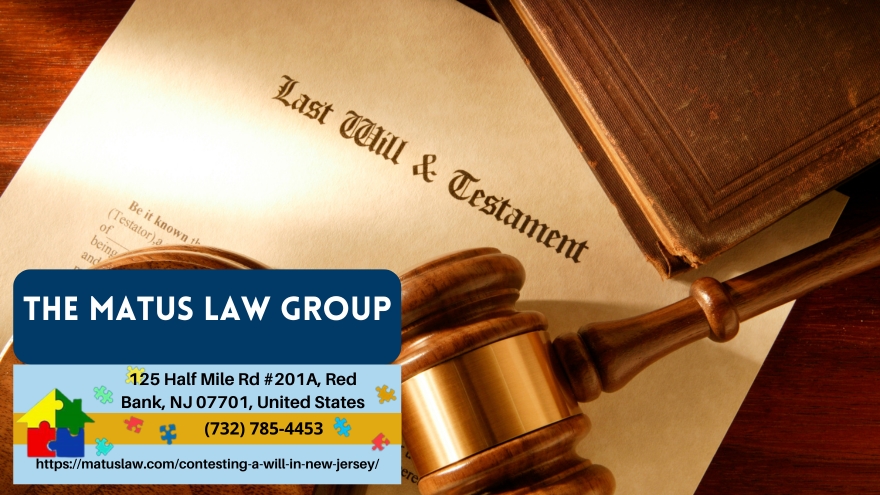New Jersey probate attorney Christine Matus (https://matuslaw.com/contesting-a-will-in-new-jersey/) of The Matus Law Group has released an in-depth resource explaining the legal process of contesting a will in New Jersey. Christine Matus outlines who may have the right to challenge a will, the grounds that may justify such a challenge, and the strict deadlines involved. The guide provides clarity for families navigating the probate process and offers insight into related estate planning options.
Christine Matus, a New Jersey probate attorney with decades of legal experience, emphasizes that The Matus Law Group does not handle will contest litigation but remains available to assist with related matters such as probate administration and estate planning. “This guide from The Matus Law Group was written to give you clarity on how will contests work in New Jersey, and where you might go from here,” said Christine Matus. The information is designed to help interested parties understand their rights and the evidentiary requirements for filing a legal challenge.
At The Matus Law Group, New Jersey probate attorney Christine Matus underscores the importance of knowing who qualifies as an “interested person” under state law before pursuing a will contest. Beneficiaries named in the will, heirs-at-law under intestacy rules, and certain creditors may have standing to bring a claim. The courts require these individuals to present strong, clear, and convincing evidence to overcome the presumption that a properly executed will reflects the true wishes of the deceased. This legal standard serves to protect the integrity of the probate process unless significant concerns arise.
The resource from The Matus Law Group details the four primary legal grounds for contesting a will in New Jersey: lack of testamentary capacity, undue influence, fraud or forgery, and improper execution. Lack of testamentary capacity involves proving that the individual signing the will did not have sufficient mental awareness at the time of signing. Undue influence occurs when mental, moral, or physical pressure overcomes the testator’s free will, often within a confidential relationship such as that of a caregiver or family member. Fraud or forgery may include misleading statements, falsified documents, or forged signatures. Improper execution refers to violations of state requirements for signing and witnessing a will.
Deadlines are a critical part of the will contest process in New Jersey. According to the information provided by Christine Matus, an individual may file a “caveat” with the probate court at any time after the person’s death but before the will is admitted to probate. This filing temporarily halts the probate process until the challenge is resolved. Once a will is admitted to probate, New Jersey residents have four months to file a formal complaint in Superior Court, while non-residents have six months. In certain cases, the court may grant a 30-day extension, but only for valid reasons.
The guide also explains that successful will contests may result in the court reverting to a prior valid will or distributing the estate according to New Jersey’s intestacy laws if no earlier will exists. While some wills include “no-contest” clauses that aim to deter challenges, these provisions are unenforceable in New Jersey if the challenge is supported by legitimate legal grounds. Courts may also consider awarding legal fees to a party who brings a valid claim in good faith.
Christine Matus advises that contesting a will can be emotionally challenging and financially demanding. Even though The Matus Law Group does not litigate will contests, the firm offers guidance in estate planning and probate matters to help families protect their interests and make informed decisions. Understanding the legal process before taking action can save time, reduce conflict, and avoid missed deadlines.
The Matus Law Group encourages individuals who believe a loved one’s will may not reflect true intentions to seek timely legal advice. A clear understanding of standing, legal grounds, and procedural requirements is essential before proceeding with a claim. Acting quickly can prevent the loss of valuable legal rights and ensure that any challenge is made within the statutory timeframe.
About The Matus Law Group:
The Matus Law Group, founded by New Jersey probate attorney Christine Matus in 1995, serves clients in probate, estate planning, and real estate matters. Christine Matus is actively involved in the legal community through the Ocean County Bar Association Board of Trustees, the Attorney Arbitration Committee, and several nonprofit boards. The firm is committed to providing straightforward legal guidance and supporting families through important decisions involving probate and estate matters.
Embeds:
Youtube Video: https://www.youtube.com/watch?v=a5Tf8DORjSw
GMB: https://www.google.com/maps?cid=3241702663730814860
Email and website:
Email: admin@matuslaw.com
Website: https://matuslaw.com/monmouth-county-nj/
Media Contact
Company Name: The Matus Law Group
Contact Person: Christine Matus
Email: Send Email
Phone: (732) 785-4453
Address:125 Half Mile Rd #201A
City: Red Bank
State: New Jersey 07701
Country: United States
Website: https://matuslaw.com/monmouth-county-nj/






